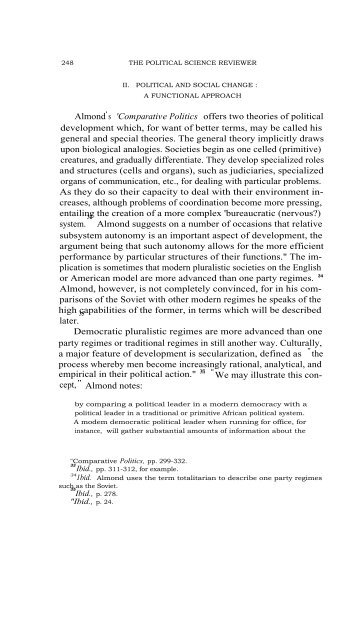FUNCTIONALISM AND ITS CRITICS - Intercollegiate Studies Institute
FUNCTIONALISM AND ITS CRITICS - Intercollegiate Studies Institute
FUNCTIONALISM AND ITS CRITICS - Intercollegiate Studies Institute
Create successful ePaper yourself
Turn your PDF publications into a flip-book with our unique Google optimized e-Paper software.
248 THE POLITICAL SCIENCE REVIEWER<br />
II. POLITICAL <strong>AND</strong> SOCIAL CHANGE :<br />
A FUNCTIONAL APPROACH<br />
Almond' s 'Comparative Politics offers two theories of political<br />
development which, for want of better terms, may be called his<br />
general and special theories. The general theory implicitly draws<br />
upon biological analogies. Societies begin as one celled (primitive)<br />
creatures, and gradually differentiate. They develop specialized roles<br />
and structures (cells and organs), such as judiciaries, specialized<br />
organs of communication, etc., for dealing with particular problems.<br />
As they do so their capacity to deal with their environment increases,<br />
although problems of coordination become more pressing,<br />
entailing the creation of a more complex 'bureaucratic (nervous?)<br />
system. 32<br />
Almond suggests on a number of occasions that relative<br />
subsystem autonomy is an important aspect of development, the<br />
argument being that such autonomy allows for the more efficient<br />
performance by particular structures of their functions." The implication<br />
is sometimes that modern pluralistic societies on the English<br />
or American model are more advanced than one party regimes. 34<br />
Almond, however, is not completely convinced, for in his comparisons<br />
of the Soviet with other modern regimes he speaks of the<br />
high capabilities of the former, in terms which will be described<br />
later. 35<br />
Democratic pluralistic regimes are more advanced than one<br />
party regimes or traditional regimes in still another way. Culturally,<br />
a major feature of development is secularization, defined as " the<br />
process whereby men become increasingly rational, analytical, and<br />
empirical in their political action." 3fi " We may illustrate this concept,<br />
" Almond notes:<br />
by comparing a political leader in a modern democracy with a<br />
political leader in a traditional or primitive African political system.<br />
A modem democratic political leader when running for office, for<br />
instance, will gather substantial amounts of information about the<br />
"Comparative Politics, pp. 299-332.<br />
33<br />
Ibid., pp. 311-312, for example.<br />
34 1bid. Almond uses the term totalitarian to describe one party regimes<br />
such as the Soviet.<br />
35<br />
Ibid., p. 278.<br />
"Ibid., p. 24.
















